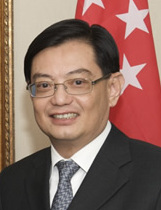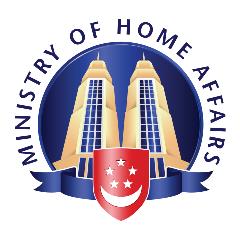
Goh Chok Tong is a Singaporean politician. A member of the People's Action Party (PAP), he succeeded Lee Kuan Yew as the second Prime Minister of Singapore on 28 November 1990 and served until 12 August 2004, when he stepped down and was succeeded by Lee Hsien Loong. He subsequently served as Senior Minister until May 2011, and as Chairman of the Monetary Authority of Singapore (MAS). He continues to serve as a Member of Parliament (MP) representing the Marine Parade Group Representation Constituency and holds the honorary title of "Emeritus Senior Minister". In November 2018, he released his autobiography, Tall Order: The Goh Chok Tong Story, which would be the first volume of a two-part biography.

The Singapore Democratic Party is a social liberal political party in Singapore.

Constituencies in Singapore are electoral divisions which may be represented by single or multiple seats in the Parliament of Singapore. Constituencies are classified as either Single Member Constituencies (SMCs) or Group Representation Constituencies (GRCs). SMCs are single-seat constituencies but GRCs have between four and six seats in Parliament.
While the small physical size of the city-state does not qualify the creation of national subdivisions in the form of provinces, states, and other national political divisions found in larger countries, the city has nonetheless been administratively subdivided in various ways throughout its history for the purpose of local administration and urban planning.

Mah Bow Tan is a Singaporean businessman and former politician. He is currently the chairman of Global Yellow Pages. A former member of the governing People's Action Party (PAP), he was a Member of Parliament (MP) representing Tampines GRC from 1988 to 2015. He was a member of the Cabinet from 1991 to 2011, serving as the Minister for Communications (1991–99), Minister for the Environment (1993-95) and Minister for National Development (1999-2011). He retired from politics in 2015.

Tampines Group Representation Constituency is a five-member Group Representation Constituency (GRC) in the eastern region of Singapore. The GRC encompasses Tampines with five sub-constituencies, namely Tampines East, Tampines West, Tampines Central, Tampines North and Tampines Changkat. The electoral boundaries were remained intact with the last change happened during the 2001 elections.

The 2006 Singaporean parliamentary general election was held on 6 May 2006. 1.22 million out of the 2.16 million eligible Singaporeans voted for members of parliament and elected their next government. The People's Action Party (PAP), in its first election under Lee Hsien Loong, won 66.6% of the overall votes and gained 82 out of 84 seats. The PAP held the office of Prime Minister for a twelfth consecutive term. The general election was held under the first-past-the-post system. The parliament was dissolved by President S R Nathan on 20 April, three weeks before the election. On Nomination Day, the PAP gained 37 seats in divisions which were uncontested by other parties. The main election issues included employment, cost of living, housing, transport, education, the need for an effective opposition voice in parliament, and the quality of the candidates.
Cheng San Group Representation Constituency is a now defunct Group Representation Constituency in the North-eastern region in Singapore. The GRC consisted of the eastern part of Ang Mo Kio, Jalan Kayu, Seletar Hills, part of Serangoon North, a large part of Hougang, Buangkok, and the whole of Sengkang New Town and Punggol New Town.

General elections were held in Singapore on 2 January 1997. 765,332 out of the eligible 1.8 million voters voted and selected their next government. The election results was released in the late evening that day and the ruling People's Action Party won a total of 81 out of 83 seats as well as a tenth consecutive term in office under the then-Prime Minister Goh Chok Tong. Other major political parties contesting in the election were the Workers' Party, Singapore Democratic Party, National Solidarity Party, Singapore People's Party and the Democratic Progressive Party.

A group representation constituency (GRC) is a type of electoral division or constituency in Singapore in which teams of candidates, instead of individual candidates, compete to be elected into Parliament as the Members of Parliament (MPs) for the constituency. The Government stated that the GRC scheme was primarily implemented to enshrine minority representation in Parliament: at least one of the MPs in a GRC must be a member of the Malay, Indian or another minority community of Singapore. In addition, it was economical for town councils, which manage public housing estates, to handle larger constituencies.

Singapore's general election to form its 12th Parliament was held on 7 May 2011. The Parliament of Singapore's maximum term is five years, within which it must be dissolved by the President of Singapore and elections held within three months, as stated in the Constitution of Singapore. Voting is mandatory in Singapore and is based on the first-past-the-post system. Elections are conducted by the Elections Department, which is under the jurisdiction of the Prime Minister’s Office. On 19 April 2011, President S.R. Nathan dissolved parliament. Nomination day was held on 27 April 2011, and for the second election in a row, the PAP did not officially return to power on nomination day, but it did return to power on the polling day. This election also marked the first and the only three-cornered fight since 2001 in Punggol East SMC before it increased to four-cornered fight on a by-election held two years later.

Heng Swee Keat is a Singaporean politician. A member of the country's governing People's Action Party (PAP), he is currently the Deputy Prime Minister, Minister for Finance and First Assistant Secretary-General of the country's governing People’s Action Party (PAP) under the current Prime Minister and the Secretary-General of the People's Action Party, Lee Hsien Loong. He was previously the Minister for Education from May 2011 to September 2015. He has been a member of parliament (MP) representing the Tampines Group Representation Constituency since the 2011 general election. He is currently the first assistant secretary-general of the People's Action Party and is poised to be the next Prime Minister of Singapore, succeeding Lee Hsien Loong. On 1 May 2019, Heng became the 12th Deputy Prime Minister of Singapore. He is also the first solo Deputy PM in 34 years. From 1985 to 2019, Singapore had two sitting deputy prime ministers working at the same time.

Sam Tan Chin Siong is a Singaporean politician. He is currently Minister of State in the Prime Minister's Office, as well as the Ministry of Manpower. He also assumed the role of Minister of State in the Ministry of Foreign Affairs when changes were announced to the Cabinet. He had previously served as a Senior Parliamentary Secretary for the Ministry of Community Development, Youth and Sports and the Ministry of Foreign Affairs. He is the Member of Parliament (MP) for the Radin Mas Single Member Constituency.

Vivian Balakrishnan, , is the Singapore Minister for Foreign Affairs and a member of the governing People's Action Party (PAP). He is also the Minister-in-charge of the Smart Nation Programme Office. He has previously held appointments in the Singapore Cabinet as Minister for Environment and Water Resources and Minister for Community Development, Youth and Sports, as well as the Second Minister for Information, Communications and the Arts, and Trade and Industry. In 2002, Balakrishnan was appointed a Minister of State at the Ministry of National Development, and the chairman of the Remaking Singapore Committee. He was also the chairman of the Young PAP from 2004 to 2008. He is a Member of Parliament (MP) representing the Holland-Bukit Timah Group Representation Constituency.

Lawrence Wong Shyun Tsai is a Singaporean politician. A member of the governing People's Action Party (PAP), he was appointed the Minister for National Development after the 2015 General Election. On 22 August 2016, he was concurrently appointed as the Second Minister for Finance. As a statesman, he has previously held appointments in Ministry of Defence, the Ministry of Education, the Ministry of Communications and Information, and the Ministry of Culture, Community and Youth. He has been a Member of Parliament (MP) since 2011 representing West Coast Group Representation Constituency (2011-2015) and Marsiling-Yew Tee Group Representation Constituency. Wong is widely seen as a key member of the fourth-generation leadership of the PAP.
Edwin Tong Chun Fai is a Singaporean politician and lawyer. He is a currently a Member of Parliament in Singapore representing the Marine Parade Group Representation Constituency (GRC).

The 2015 Singaporean general election was held on 11 September to form Singapore's Parliament. The previous Parliament was dissolved on 25 August 2015 by President Tony Tan on the advice of Prime Minister Lee Hsien Loong, and candidates were nominated on 1 September.
Koh Poh Koon is a Singaporean politician and colorectal surgeon. A member of the governing People's Action Party, Koh has been serving as a Member of Parliament (MP) since September 2015, representing Ang Mo Kio GRC. Since January 2016, he is also a Minister of State in the Ministry of National Development and the Ministry of Trade and Industry. He is also the current Deputy Secretary-General of the National Trades Union Congress.

Singapore's next parliamentary general election must be held by 15 April 2021. According to the Constitution, the Parliament of Singapore's maximum term is five years from the date of the first sitting of Parliament following a general election, after which it is dissolved by operation of law. However, the Prime Minister may advise the President to dissolve Parliament before the five-year period is up, which had been suggested, but might not be happening in the year 2019. A general election must be held within three months after a dissolution of Parliament. Singapore uses the first-past-the-post system of election, and voting is mandatory for all Singaporeans aged at least 21. Elections are conducted by the Elections Department, which is under the Prime Minister's Office.















